DENVER – In a country facing large political divides, many Coloradans do share a common list of concerns for our state, including the political landscape itself. Specifically, many Coloradans (40%) identify their political beliefs as a dominant factor that prevents them from feeling a sense of belonging in their community, according to newly released findings from the 2024 Colorado Health Foundation (CHF) Pulse Poll.
Now in its fifth year, a bipartisan team of researchers collected responses from 2,404 Coloradans between May 20 and June 24, 2024 for the annual CHF poll.
The Phase I results, released in July, demonstrate growing concerns about housing affordability and rising costs of living across the state, including nearly nine out of 10 respondents (89%) rating the issue of housing affordability as an extreme or very serious problem. Concerns about housing affordability and the cost of living are higher in 2024 than at any other time in the five-year history of the poll.
Concerns Beyond Housing and Cost of Living
Going beyond their housing and cost of living concerns, six other challenges have a majority of respondents saying they are extremely or very serious issues in Colorado including drug overdoses (65%), crime (59%), mental health (59%), jobs and the economy (57%), immigration (53%), and wildfires and other natural disasters (53%).
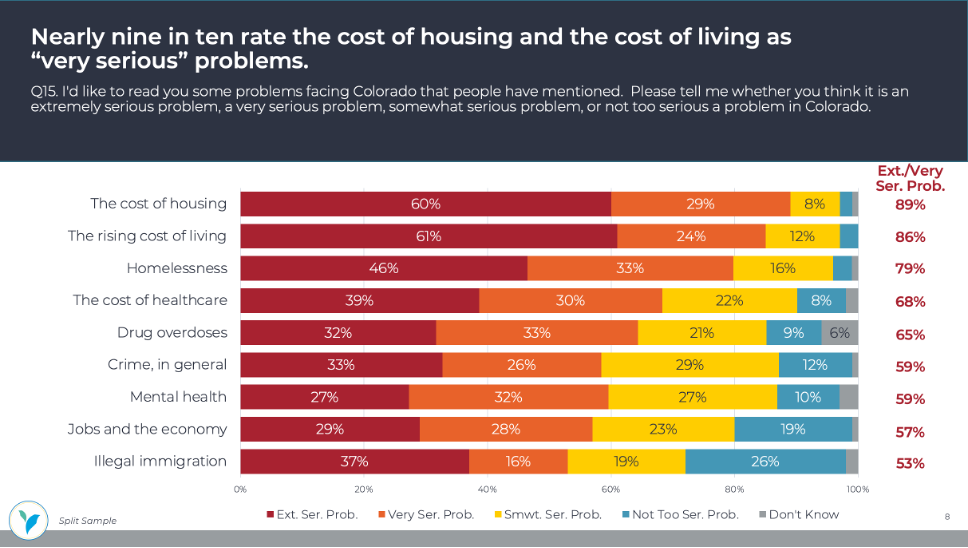
Wildfires remain high on list of concerns
Even before the most recent outbreak of wildfires across the state, respondents remain consistent in rating wildfires or other natural disasters as an extremely or very serious issue (53% in 2024 compared to 57% in 2023), including more than half of the respondents (51%) in the seven-county Denver metro region and as high as 64% of those living on the Western slope.
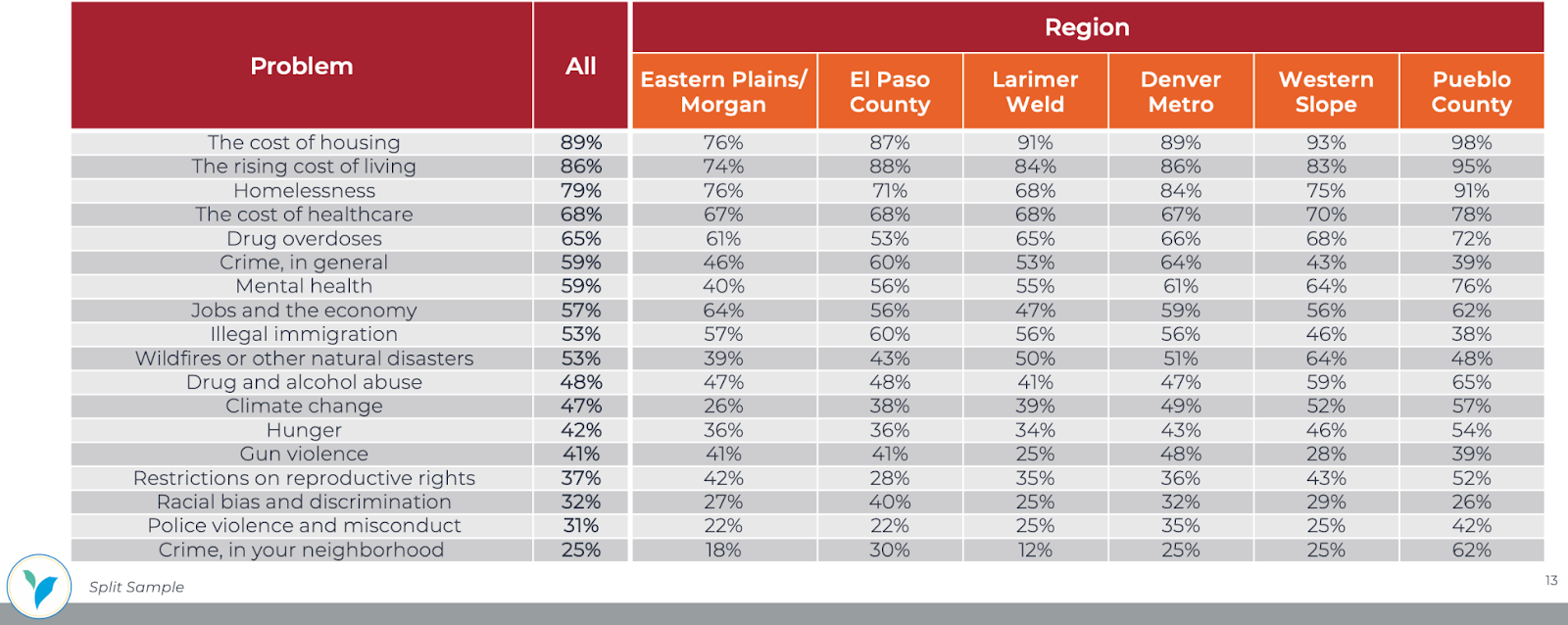
A Sense of Belonging
Respondents were asked about their sense of belonging in various places they travel through in their daily lives and the individual elements of their identity that may impact the degree to which they feel a sense of belonging in their community. While the poll data reveal that many Coloradans feel they belong – about 75% feel they belong in their neighborhood, 78% in their workplace, and 61% feel belonging in public places in their community all or most of the time – the numbers begin to decrease when looking at specific groups of people.
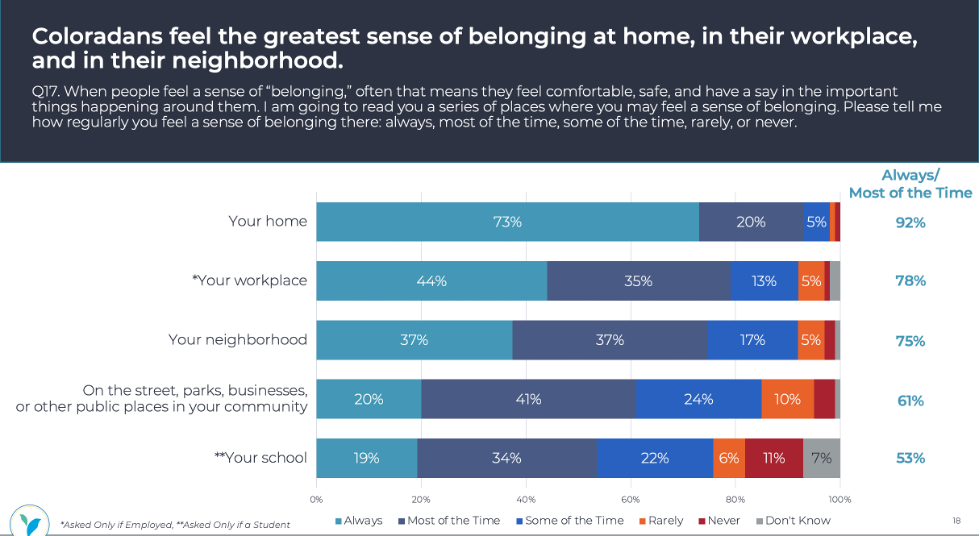
“We believe that a sense of belonging – being connected to community and feeling that our contributions are valued in the places we call home – is essential to people’s health and well-being,” said Kyle Rojas Legleiter, senior director of policy at The Colorado Health Foundation. “This year, we asked respondents about the degree to which they experience a sense of belonging and, with a large sample size, we’re able to analyze and compare across key demographics, the relationship between respondents’ sense of belonging and the other challenges confronting them, such as high costs of living and housing.”
But even with the strength of feeling a sense of belonging at home, the Poll’s Phase I release revealed a troubling pattern showing that a majority of Coloradans are not confident they will be able to remain in the places where they currently feel belonging as they look to the future. More than 70% of respondents are worried that they may not be able to afford to live in Colorado in the future. And for those with children, the concerns extend to the next generation as well with 90% of respondents worried that their children will not be able to continue living in Colorado due to the high costs of living and housing.
Additionally, while three out of five respondents (61%) said they feel a sense of belonging, “always” or “most of the time,” in public places like parks and local businesses, the numbers start to decline when looking specifically at the experiences of people of color, LGBTQ+ people, and people living with disabilities:
- AAPI, Black, and Native American/Indigenous respondents are more likely to say their culture or background was a reason they didn’t feel a sense of belonging.
- LGBTQ+ Coloradans and those living with disabilities express less belonging than others. LGBTQ+ Coloradans feel somewhat less welcome in parts of their communities, including 11% less in their neighborhoods and 4% less in other public places.
Political Beliefs Associated with a Lack of Belonging
For those respondents that did not always feel like they belonged, a staggering 40% indicated that their political beliefs made them feel like they didn’t belong somewhere. The response was more than double any other factor considered, dropping to just 19% for respondents’ age, 16% for race, 14% for culture or background, 14% for physical appearance, and 13% for religion.
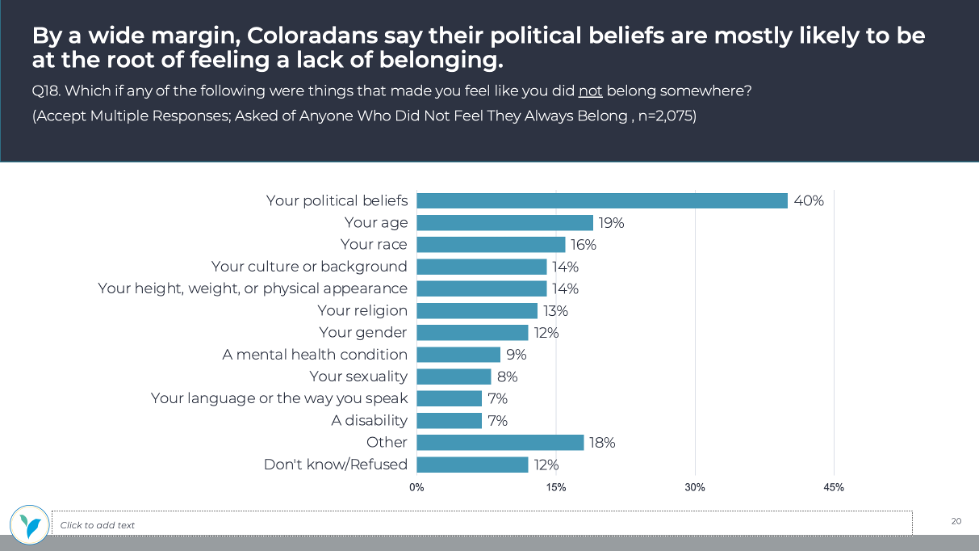
This may signal that political divides are weakening the sense of belonging that is important for people’s health and well-being.
“It is a sign of our political polarized times that out of every potential reason for not feeling like they belonged, more Coloradans point to their political beliefs than any other attribute,” said Lori Weigel, Republican pollster for Pulse and principal of New Bridge Strategy. “While this was more commonly cited than anything else among voters of all political stripes, Republicans are nearly twice as likely as their Democratic counterparts to say that political views are a reason they have felt isolated. We have heard this in focus groups around our state over the years - Coloradans telling us they have lost connections to friends and family due to political disputes. The Pulse Poll data demonstrates the very real impact that partisan polarization is having on our communities."
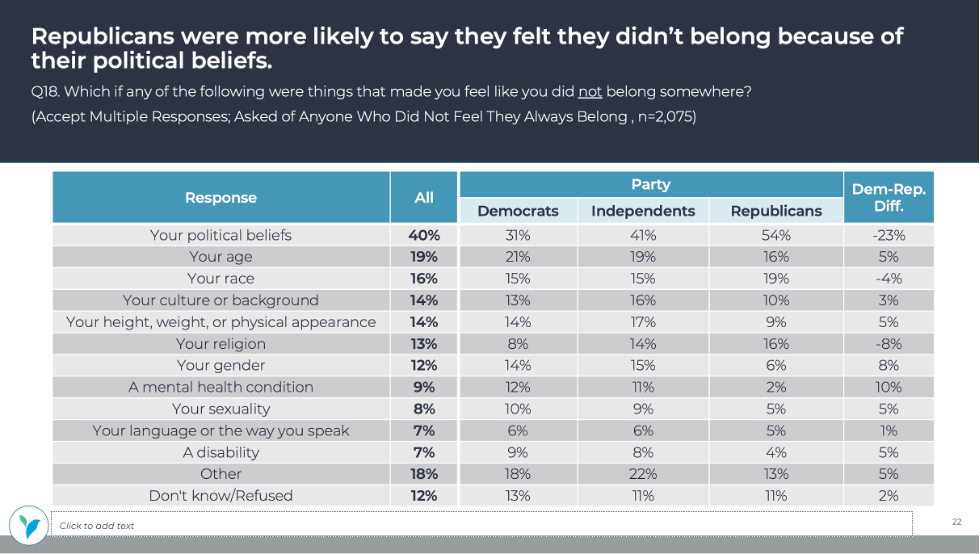
Mental Health and Drug and Alcohol Use
Stress and uncertainty fueled by high costs of living, housing instability, and other daily stressors has taken its toll with 59% of Coloradans saying they’ve experienced mental health strains such as anxiety, depression, loneliness, or stress in the last year. And, of those who have experienced mental health strain, 41% report postponing mental health care in the past year, a notable increase from the 27% who reported postponed mental health care in the 2023 poll.
Although respondents’ overall rating of “mental health” as a serious concern in Colorado dropped 10% to 59% year over year, the percentage of people saying it's a serious problem remains stable at 27%.
“Mental health may be a less top-of-mind concern for Coloradans this year, given all the other issues demanding their attention. However, the data show it remains a widespread challenge,” said Dave Metz, Democratic pollster for Pulse and president of FM3 Research. “Three in five Coloradans (59%) report having experienced mental health strain in the past year, up slightly from 2023. And more than one-quarter say they have postponed mental health care. But in this year’s survey, we also see some consensus around a potential solution: a clear plurality wants action taken to make it easier to cover mental healthcare through health insurance.”
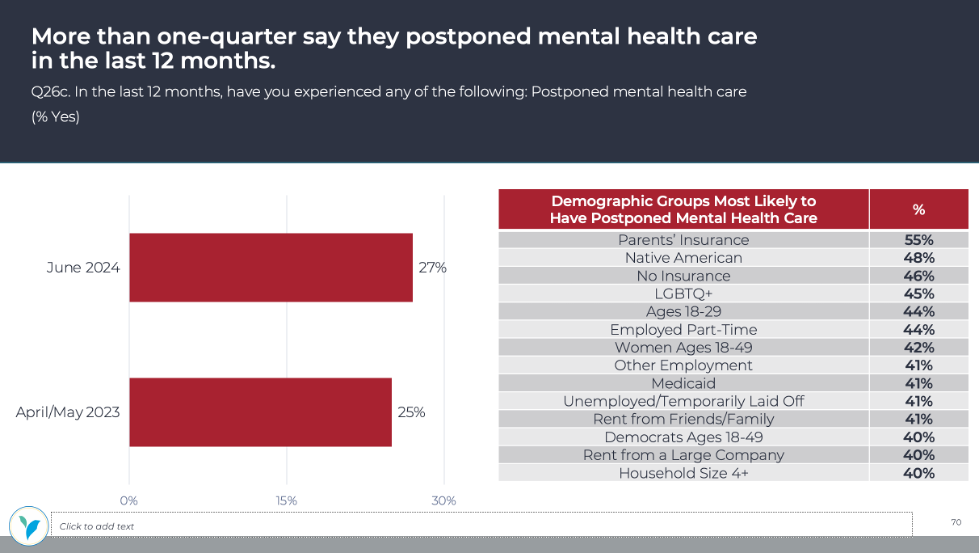
Mental Health Strain and Potential Solutions
With three in five respondents rating mental health as a very serious problem and more than a quarter saying they have postponed mental health care in the last year, the strain and isolation remain significant factors across diverse demographics.
When asked about the most important actions that could improve mental health or health care in Colorado, 40% said “increasing the ability to use health insurance to pay for mental health services.” Nineteen percent said, “increasing government funding and resources for local mental health services and facilities,” and another 19% said “increasing government funding and resources for mental health prevention programs and services in communities.”
Crime
While 59% of respondents see "crime, in general" as an extremely or very serious problem in Colorado, the number drops to 25% when respondents were asked specifically about "crime in your neighborhood" - the lowest ranked concern in 2024 across all that were tested in this year’s poll.
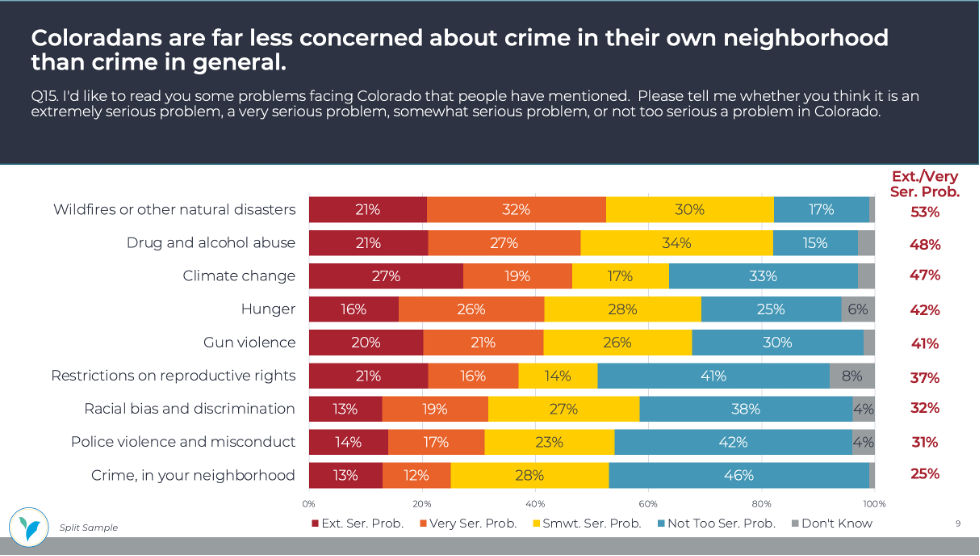
Latino and Native American Coloradans are more concerned about crime in their own neighborhoods than are others:
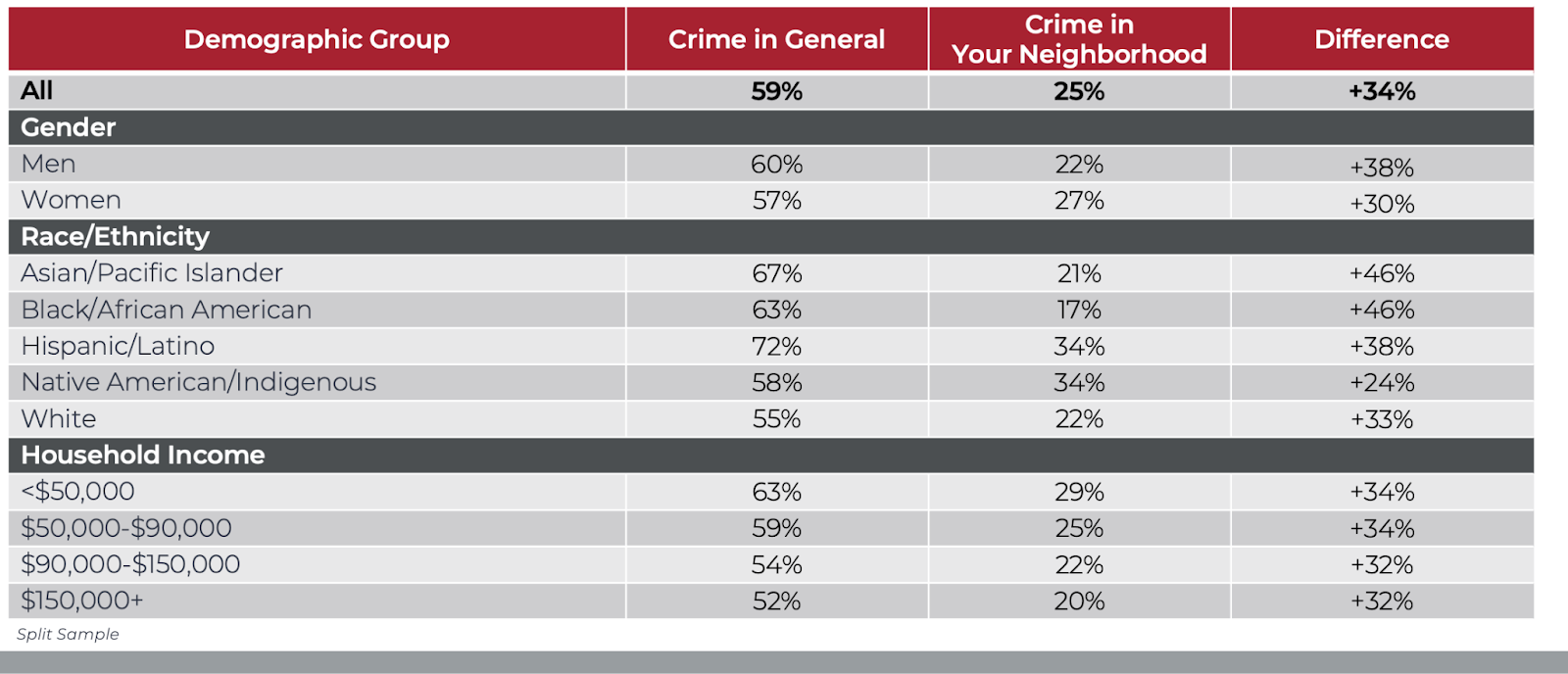
The gap between concerns about crime overall and crime in the neighborhood is greatest among Republicans:
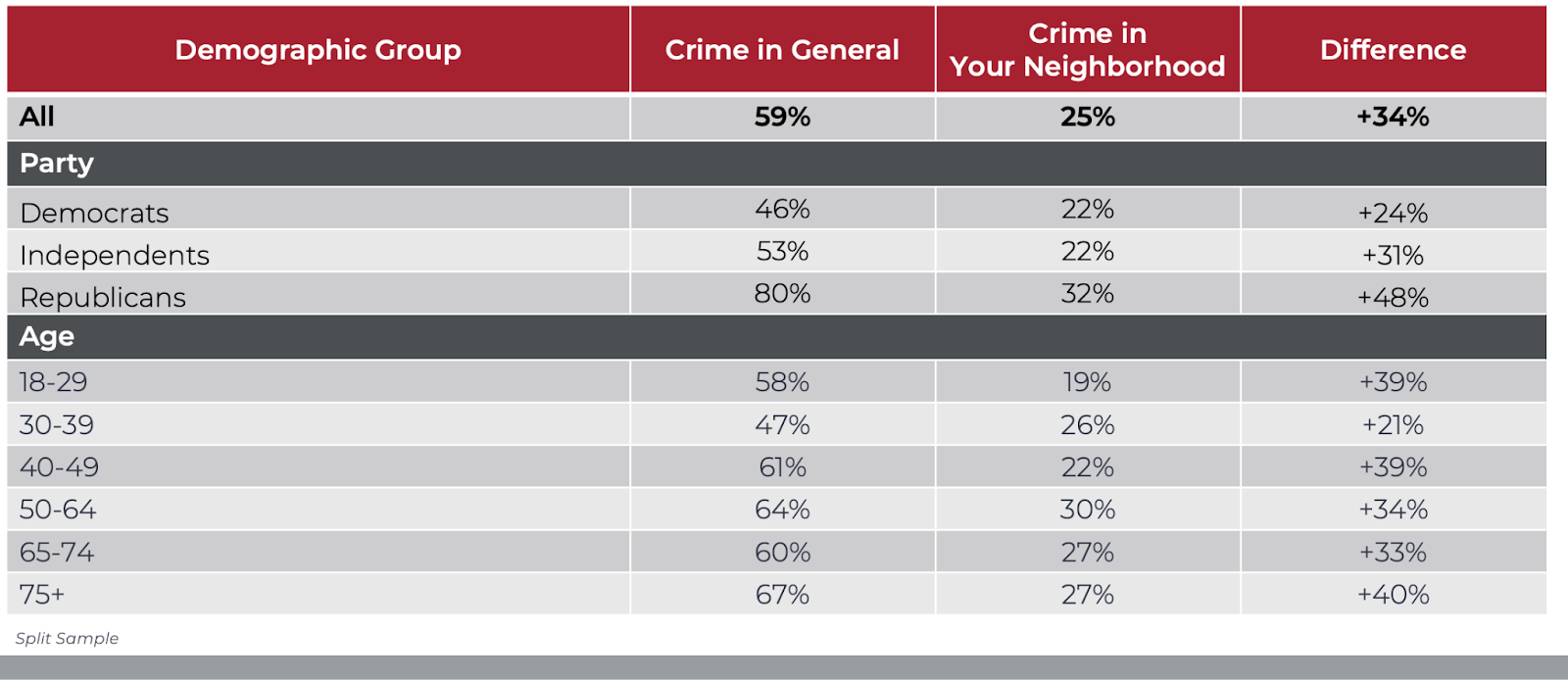
Immigration Concerns Rise Dramatically
Concerns about illegal immigration (the act of immigrating without approved credentials, not in reference to any specific individuals) increased about 20% (34% in 2023 to 53% in 2024) and jumped from Coloradans’ last ranking concern in 2023 to 8th among all concerns in 2024.
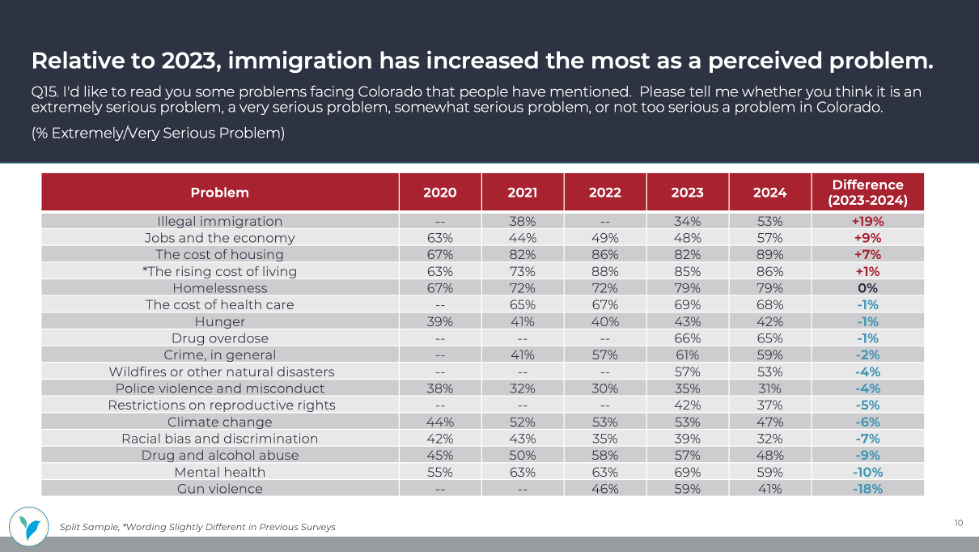
And, in an open-ended question about the most important issues facing Colorado right now, the percentage of people citing immigration rose from just 1% in 2023 to 13% in 2024. It was the largest and only double-digit increase of the open-ended topics over the last year.
2024 Pulse Poll data is being released in three phases.
Each briefing will provide detailed data about the challenges that Coloradans are facing, the impact of those challenges, and the types of solutions that people want to see prioritized by policymakers.
The first briefing, Economic Concerns and Their Impact on Our Financial, Mental and Physical Well-Being took place in mid-July and is available to rewatch online here (Presented in English with live interpretation in Spanish).
Register for briefings two and three:
- Beyond the Numbers: Understanding Coloradans’ Top Concerns and How They Connect to Our Sense of Belonging
(Presented in English with live interpretation in Spanish)
Regionally-specific data will also be available and provided upon request
Data available online at 6 a.m. on Tuesday, August 13
Briefing at 10 a.m. MT on Wednesday, August 14 | Register
- Deep Dive on Responses from Hispanic and Latino People in Colorado
(Presented in Spanish and English. Simultaneous interpretation will be available)
Data available online at 6 a.m. on Tuesday, September 3
Briefing at 5:30 p.m. on Monday, September 9 | Register
In a state where Hispanic and Latino people comprise 22% of the population, it is crucial to understand their experiences and concerns. This session will kick off Hispanic Heritage Month by providing valuable insights into the recent Colorado Health Foundation Pulse Poll data on the perspectives of Hispanic and Latino Coloradans, including the unique challenges, issues and aspirations of this significant and diverse demographic group. Simultaneous interpretation will be available, fostering an environment where diverse perspectives are heard and valued.
Interviews are available with research experts, Colorado Health Foundation leaders, local community organizations and impacted Coloradans.
About Pulse Poll 2024
The 2024 Pulse Poll was conducted by telephone and online from May 20 to June 24, 2024 among a random representative sample of 2,404 adults age 18 and older living in Colorado. The margin of sampling error for the full sample is +/-2.9% at the 95% confidence interval. For results based on sub-groups, the margin of sampling error is higher.
CHF is releasing its annual Pulse Poll findings in three phases. The second phase results will be released in August with a deep-dive analysis of other key findings and in September with a deep dive on the perspectives of Hispanic and Latino respondents.
About Pulse
At The Colorado Health Foundation, we believe in listening first. Each year, we ensure Coloradans’ voices are heard on crucial issues like affordable housing, health care and mental well-being. By gathering data rooted in Coloradans’ experiences and perspectives, Pulse provides valuable insights to inform policy decisions that will have a lasting impact on the well-being of Colorado's communities for years to come. For more information, visit www.copulsepoll.org.
About The Colorado Health Foundation
The Colorado Health Foundation is a statewide philanthropic organization that champions the overall health and well-being of every Coloradan by advocating for and investing in solutions and policies that drive health equity and racial justice. Every day, the Foundation collaborates with organizations and communities across the state to break down the many systemic inequities that stand in the way of health. Learn more at www.coloradohealth.org.
